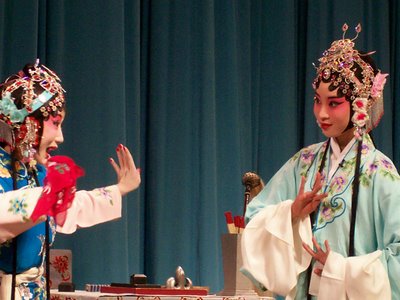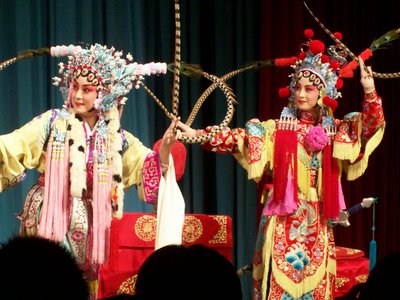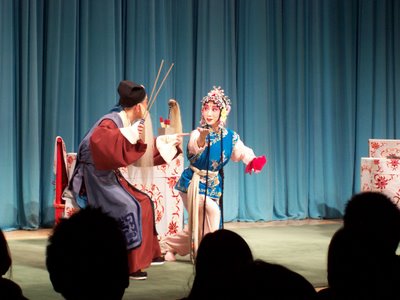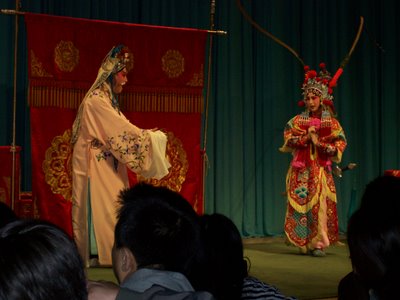
(Fingers Famously Splayed)
Haiyan and I met on Friday to enjoy a speical performance of Kunqu Opera at Beijing University. The performance was rather engaging, not because I could understand it, again only about 0.09%, but because it is that particular sensation of knowing that the music is beautiful to the ears of those that are accustomed to it, thus making it beautiful to you. And that special asian quality of hyper-flare, color, and shininess that you cannot look away from. It kept occuring to me that they might be from a different solar system. But such feelings stem from encounters with sci-fi movie extravagnaces, such as Star Wars, which were no doubt heavily influenced by this aesthetic.  In Kunqu, much attention is focused on the hands; as their complicated comfigurations often narrate along with the warbly and unmelodic, but lovely singing. The females hands and fingers are constantly moving through expressive arrangements about their face or twirling a piece of silk or playing with their feather antennaes (as seen above).
In Kunqu, much attention is focused on the hands; as their complicated comfigurations often narrate along with the warbly and unmelodic, but lovely singing. The females hands and fingers are constantly moving through expressive arrangements about their face or twirling a piece of silk or playing with their feather antennaes (as seen above). 
As for the music, Chinese opera seems based on a completely different math than the singing of western music. We are not accustomed to this "lack of melody." There is no decernable melodic scheme to Kunqu pieces, or at least one I could recognize. I mean there is no musical theme that is recapitulated upon again and again. We are used to some of verse- refrain-verse, or some varient there of. Even very complicated musical pieces follow this pattern to some degree as this is musical math that we find pleasurable. But this does not exist in Kunqu pieces. Its very difficult to explain, especially when I do not know much about it, but these are my impressions. So, indeed, there are no "pieces." There are but perhaps just scenes that are, by closest comparison to western opera, narrated in the fashion of a recitative, such that the sung text is vaguely guided by the rhythm of natural speech, and underneath is a aggitated musical accompaniement of drums and flutes. The voice rolls through pitches without breaking for what we call "notes" in an octave scale. Its just rolls up and down, and all crazily high to boot.
The drum is a prominent feature of the sound of Kunqu as it sort of conducts the actors movements on the stage. That is, they seem to bounce and glide and change positions at the drum's request. The sound of the drum is peculiar as it resembles the the exponentially rapid "pong" made by a ball dropping as it comes closer to the ground. There was some very lovely flute as well. The instrumentation seems very important, but the small ensemble of traditional chinese instruments was not acknowledged in the final bows.
 All in all, I really loved Kunqu, right down to the adorableness of the all Chinese audience (not a tourist venue) taking pictures during the performances with their cell phones (making it okay for me to take these), and yelling out randomly that they liked what they were seeing, and in general smiling through out the entire performance (I often looked around at everyone). They were hearty laughers and clappers and this type of exuberant responsiveness no doubt made the experience all the more lovely.
All in all, I really loved Kunqu, right down to the adorableness of the all Chinese audience (not a tourist venue) taking pictures during the performances with their cell phones (making it okay for me to take these), and yelling out randomly that they liked what they were seeing, and in general smiling through out the entire performance (I often looked around at everyone). They were hearty laughers and clappers and this type of exuberant responsiveness no doubt made the experience all the more lovely.
